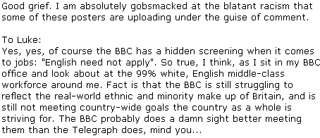The Telegraph puts BBC Executives in an assassin's gun sights
Since doing my sweeping review of British newspaper websites earlier in the year, I've found myself returning more and more to The Telegraph's site. They have a lively line-up of bloggers, and they've been doing a lot to encourage user-generated content from their readers, which I've enjoyed.

In fact, I suspect that this may translate into a couple of physical sales for the printed edition next week when I'm in the UK.
They've gone to town a bit today in their BBC-bashing however. There is a vote for readers to choose which editorial leader they would like to see fired by the BBC, and a lengthy forum asking whether Telegraph readers 'still trust the BBC'.
Aside from the inevitable spluttering about the use of the word 'still', the Telegraph's speakers' corner will make for pretty depressing reading in White City.
In fact one member of BBC staff was annoyed enough to make an ill-judged intervention into the thread.
From experience over on the Biased BBC blog, I know that it is perfectly possible as a current or ex-member of BBC staff to engage in conversation and debate with people who don't agree with the concept and output of the BBC. Seb's opening salvo suggesting that a lot of the Telegraph posters were 'racist' probably isn't one of the best ways of going about it.

One of the things I liked about the thread is the theme of "nostalgia ain't what it used to be" that runs through it.
Pretty much everyone contributing to The Telegraph is convinced that the BBC isn't as trustworthy or impartial as it used to be, but they all seem to pinpoint the start of the decline on a different touchstone issue.
Some blame the Hutton Report, other's the moment that 'New' Labour were elected. Geoff reckons it all started with "the 'lefty' bbc editing footage from the Miners Strike". Richard T has "NEVER trusted the BBC since the Falklands war".
Raymond Cox, meanwhile, thinks the Swinging Sixties are when it all went wrong for Auntie - "I haven't really trusted the BBC since about 1961 when it began to go downhill and, in effect, compromised its own charter, which declared to 'uphold all that is good'"
Fred Rogers harks back to the golden era of the war - "Is this the BBC of Alvar Liddell, the BBC of true wartime (WWII) commentary we listened to so avidly through those dark days?", although David thinks the rot had set in even then - "The BBC has ever since 1940 at least been a near communist front organisation."
Max Muir goes even further back, complaining that "In the thirties, Churchill and any other critics of Hitler were kept off the air. Instead, appeasers were given more or less full access."
I daresay at some point someone will pin it all on opting for Marconi's 405 line format rather than sticking with the initial Baird 30 line format.
There is one thing in The Telegraph's coverage that really jarred with me however. Perhaps I'm being over-sensitive, but is the Flash movie promoting this debate - an assassin's gun sights moving across and targeting individual BBC Executives - not just a little bit in bad taste?
I posted the following comment elsewhere on your blog, but it's more suited to this thead:
"I recall a debate we had on the Biased BBC site a while back on the apparent reluctance of the BBC to delete an anti-Semitic comment from The Editors blog despite many complaints, from yourself included. I remember that you posted an article about it on your blog at the time.
In the light of that article, in which you described how you were confident that the BBC would delete the comment after the complaints and were amazed when it didn't, I thought you might be interested in the fact that the BBC has now dropped the pretence of fair play and is refusing to delete an anti-Semitic comment from one of its message boards, while deleting complaints about the comment from the thread:
http://www.melaniephillips.com/a...cles-new/? p=524
The BBC is going from bad to worse."
Re the Telegraph article, People obviously have different perceptions of when the BBC rot started because of their different age groups and differing levels of exposure to the BBC. I have been aware of the PC, left wing bias for some time now but I think what really clinched it for me was the BBC's dutiful regurgitating of Hezbollah propaganda during last year's Israel-Hezbollah war.
That said, I agree that an assassin's gun sights moving over BBC executives' faces is in extremely poor taste.
>> People obviously have different perceptions of when the BBC rot started because of their different age groups and differing levels of exposure to the BBC.
Of course, that invites the argument that, rather like pop music, it isn't that the BBC 'rot' has set in, but rather that the older we get, the more intolerant we get of anything not in total accordance with our views, or indeed, that bloody racket on MTV these days.
Actually, for this article I did start trying to draw a timeline which would illustrate the key dates, but I was running out of battery on the laptop so just ended up posting 'as is' without the illustration.
There is no doubt some great 3D data visualisation that could be done with a survey on median age and satisfaction with the BBC.